May 2013
May 2013 sadmin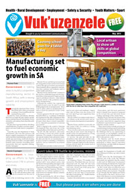
Manufacturing set to fuel economic growth in SA
Manufacturing set to fuel economic growth in SA sadminGovernment is taking steps to build a competitive manufacturing sector in South Africa, with a strong growth and employment capacity.
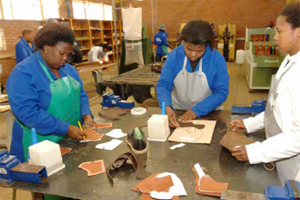 Through the Industrial Policy Action Plan (IPAP) 2013/2014, government is seeking to boost and diversify the manufacturing sector.
Through the Industrial Policy Action Plan (IPAP) 2013/2014, government is seeking to boost and diversify the manufacturing sector.
Unveiled by Trade and Industry Minister Rob Davies in April, the plan outlines specific actions and time lines for stimulating various industries and making them internationally competitive.
The plan aims to promote labour-absorbing industrialisation, broaden economic participation and raise South Africa’s competitiveness.
From this year, the Department of Trade and Industry (dti) and other partners will deepen support programmes for industries such as furniture manufacturing, automotive, metals, agro-processing, small-scale farming, clothing, footwear, textiles, crocodile leather, biofuels, crafts, cosmetics, sawmilling, pharmaceuticals, fruit and vegetable canning, forestry and paper.
Minister Davies said that government had also designated certain sectors to boost local content through government procurement. These included railway equipment, transmission lines, uniforms and medicine used in public health institutions.
Minister Davies said that IPAP “is based on the need for sustainable long-term development that is underpinned by higher growth, exports and labour-intensive, value-adding economic activity in the production sectors, led by manufacturing”.
Although the country has experienced growth in recent years, he said, it was still battling high levels of unemployment. “If we want to make a dent on unemployment we need to boost the productive sector of the economy.”
Director-general of the dti Lionel October described IPAP as “a roadmap of industrial development for the other departments that actively partner with the dti in delivering on all areas where there is shared responsibility for important programmes of national government”.
IPAP is aligned to the country’s National Development Plan and forms one of the principal pillars of the National Growth Plan.
The dti will offer incentives, allowances and training to boost and protect specific industries. For example, to increase production and job creation in the automotive sector, the plan provides for car manufacturers to be given incentives including a Production Incentive and an Automotive Investment Allowance.
The allowance provides a return on investment in new plant and machinery. Import duty rates for these were also frozen at 20 per cent and 25 per cent respectively from 1 January 2013.
The aim of IPAP is to reduce South Africa’s over reliance on the services sector and anchor economic development on manufacturing.
Minister Davies said that services jobs are only secure if they are rooted in a strong manufacturing sector.
“Even if we have jobs in the services sector, those jobs are more secure and stronger in quality if they are underpinned by a strong value added manufacturing sector.”
In services, the plan provides for the stimulation of the call centre and film making industries. The plan aims to increase the number of people employed in the business process services from the current level of 14 000 to 40 000 by 2015.
Film-makers and television producers stand to benefit from incentives proposed in the revised Film and Television Sector Strategy and design of Key Action Plans.
Minister Davies said since the launch of the first IPAP in 2010, government had ensured that policy interventions supported deep localisation of procurement to support local industries and job creation.
“These interventions include growing our manufacturing, boosting exports and beefing up our competition policies. We think despite the challenges that we are experiencing in our economy, we can highlight a number of achievements in the implementation of our IPAP in the past few years.”
The Minister said the South African economy had to create new export markets, particularly in Africa, improve innovation and technology and align skills development with its industrial policy.
Govt takes TB battle to prisons, mines
Govt takes TB battle to prisons, mines sadminGovernment is stepping up efforts to fight tuberculosis (TB) in prisons and mines.
At Pollsmoor Prison in Cape Town, all new inmates are to be tested for TB, while all mineworkers will also be screened over the next 12 months.
State of the art technology, known as the GeneXpert, will be used to test new inmates.
The GeneXpert machine reduces the time needed to diagnose the presence of TB from about six weeks to two hours, allowing medical staff to treat patients sooner, stop the disease from spreading and improve the effectiveness of government’s TB Control Programme and National Strategic Plan.
Deputy President Kgalema Motlanthe handed over six of these machines to Correctional Services Minister Sibusiso Ndebele at the prison recently.
“We are prioritising the roll-out of these machines in correctional facilities, mining and other congregate areas with elevated risks of infection,” the Deputy President explained.
At Pollsmoor Prison, 735 inmates were screened for TB in March this year. Ten were diagnosed with TB, while 165 who were suspected of having the disease underwent more tests. Twenty-one of this group also tested positive for TB.
“Everyone who has TB can possibly infect 20 others in one year. They’ve saved at least 400 others from getting TB,” Health Minister Aaron Motsoaledi said.
Inmates who tested positive were required to supply the Department of Health with their addresses for follow-up visits to family members.
South Africa has the third-highest TB infection rate in the world. But Minister Motsoaledi was optimistic that the country would reach its Millennium Development Goal of reducing TB infections by 50 per cent in the days left before the target date 2015.
In 2011, South Africa unveiled three new strategies to fight the pandemic in mines, among children and in prisons. Originally, it was thought that the highest prevalence of TB occurred in the mines. However, incidence of the disease in overcrowded prisons is thought to be higher than that in mines.
Dannhauser brightens up residents’ lives
Dannhauser brightens up residents’ lives sadminInfrastructure
Philani Motha, a father of five, has lived all his life in Doringkop village, in KwaZulu-Natal, without electricity.
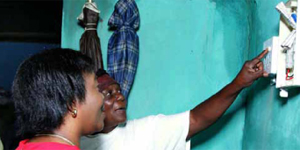 Even though life was tough, Motha always had faith that one day he would be able to turn on a switch and light up his home.
Even though life was tough, Motha always had faith that one day he would be able to turn on a switch and light up his home.
That faith finally paid off recently when Motha’s home was among the more than 1 250 households, which fall under the Dannhauser Municipality, that received electricity.
“Life was very difficult and expensive for my family. For as long as I can remember I had to go to the bush to find firewood for my wife to cook supper. In winter we would start a fire inside our rondavel to keep us warm at night.” Motha says his wife used to wake up at the crack of dawn to start a fire.
“She had to wake up at 4am everyday to prepare warm water for the children to bath before going to school. Sometimes they would have a cold breakfast if there was no time to start a fire,” Motha adds.
His eldest daughter, who is now 24, did not have the luxury of studying in an electrified room and had to study by candlelight throughout the schooling career.
Motha jokes that she drove all the way from the big city of Pretoria to confirm for herself that there was electricity in the area she grew up in.
He explains that the expenses that came with not having electricity affected his subsistence farmer’s budget severely.
“At a later stage we decided to buy generators to help with power in the household. It cost R60 to fill five litres in the generator, which lasted for four hours. It was a luxury for us to listen to the radio or watch television,” Motha says.
A bubbly Motha adds that after living his whole life without electricity, he is happy that lifestyle is behind him.
“I sit on the couch and listen to the radio during the day while watching my crops and cattle grazing in the fields.”
The Dannhauser Municipality is on a mission to ensure that more of its residents can enjoy the same experience as Motha.
It has finalised plans and processes to deliver electricity to every household by March 2014. Recently, KwaZulu-Natal Cooperative Governance and Traditional Affairs MEC Nomusa Dube announced that the remaining 1 000 homes without electricity would receive it within a year, ensuring the municipality achieved 100 per cent electrification.
According to Veli Mdlalose, compliance and public participation officer in the office of the municipal manager, the municipality has spent R31 million on the Electrification of Households Programme since it started in 2010.
Mdlalose attributes the success of the project to a good working relationship between the different parties, which include Eskom, Cooperative Governance and Traditional Affairs KZN and the Department of Energy.
The municipality conducted a door-to-door data-collecting programme to find out how many households needed electricity and with the help of these figures was able to structure the programme and start the process.
For more information contact the Dannhauser Municipality on 034 621 2666.
Limpopo school bursting with joy over water supply
Limpopo school bursting with joy over water supply sadminInfrastructure
The 162 learners at Junction Primary School, in the citrus producing valley of Tzaneen, Limpopo, don’t have to depend on the nearby Mahela Farm for a weekly water supply anymore.
Thanks to the Department of Basic Education, the school now enjoys its own supply of water in the form of a borehole and water tank.
With the new water supply, the school is also running its own vegetable garden and has bought a lawn mower from the proceeds of vegetable sales.
Ablution facilities have also been constructed at the school as part of the Accelerated Schools Infrastructure Delivery programme.
The programme is aimed at providing schools with basic infrastructure.
Aspects of the programme include:
- 510 schools that were built, with inappropriate structures being replaced with brand new schools that meet the department’s standards of basic functionality.
- 939 schools that previously did not have any access to sanitation will be supplied with a basic level of sanitation.
- 932 schools will get electricity for the first time.
- 1145 will be provided with basic water supplies for the first time.
In the 2011/12 financial year the department appointed the Mvula Trust to carry out an assessment of water and sanitation facilities at schools.
Junction Primary School was one of the schools earmarked for the implementation of water and sanitation projects. In total, 78 schools were assessed and verified, of which 38 were selected for water and 40 for sanitation projects.
New school for Libode learners
New school for Libode learners sadminInfrastructure
Residents of Libode in the Eastern Cape were beaming with joy when Basic Education Minister Angie Motshekga officially handed over a brand new school to the community.
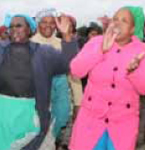 Sonata Junior Primary School was built through a private-public partnership between the Departments of Basic Education, Mineral Resources and AngloGold Ashanti.
Sonata Junior Primary School was built through a private-public partnership between the Departments of Basic Education, Mineral Resources and AngloGold Ashanti.
The project saw the stakeholders come together to replace an inappropriate mud structure with six classrooms, an administration block, ablution facilities and fencing around the school grounds.
Speaking at the handover recently, Minister Motshekga said that the school had brought hope to young people in the area.
“This successful partnership that’s aimed at bringing quality schools to historically disadvantaged children in rural parts of the country has given us new hope for Sonata Junior Primary,” said Minister Motshekga.
“We thank AngloGold Ashanti for the commitment to uplift the standards of education, particularly in rural areas, which have seen decades of exclusion and unequal treatment. The new structure will improve the quality of life and education of the children and teachers. It will contribute to their constitutional right to dignity.”
The vice president of AngloGold Ashanti, Mike O’Hare, described the handover as a proud moment in the partnership.
“This is an ongoing commitment for us and we have built a number of schools in collaboration with government since 2006,” he said. O’Hare also announced that the company would provide new school uniforms to every learner at the school.
The investment by AngloGold Ashanti has boosted government’s drive to eliminate mud schools, inappropriate and unsafe school structures by 2015.
Government has committed funds to deal with the infrastructure backlog through the Accelerated Schools Infrastructure Delivery Initiative. By working with the private sector, government is making headway in providing learners with safe and suitable environments conducive to learning and teaching.
In the past year alone, the Department of Basic Education (DBE) in partnership with business partners has built several new schools.
In Lephalale in Limpopo DBE joined hands with Vodacom to build a new state-of-the-art school to service the town, which is experiencing rapid population growth.
Lephalale Primary School comprises 26 classrooms, a computer and science laboratory, an administration block and sports field. The school also received a multimedia centre, which features the latest communications technology.
In the North West, Sunrise View Primary School was officially handed over to the community of Boitekong in January 2013. The school, which will ultimately include a secondary school and a community hall, is part of an R80 million partnership between DBE and Impala Bafokeng Trust.
In February 2013, DBE opened a new Grade R facility at Mbonisweni Primary School in Tongaat, KwaZulu-Natal. The facility was the latest project of the Adopt-A-School Foundation.
Through these projects DBE and private partners are working together to steadily ease the backlog of school infrastructure.
* Terence Khala works for the Department of Basic Education.
N West milk bank helps tackle infant deaths
N West milk bank helps tackle infant deaths sadminA human milk bank in the North West, the first in the country, is proving to be the difference between life and death for babies in the province.
Since the introduction of the milk bank at the Potchefstroom Hospital, the infant mortality rate at the hospital has decreased significantly.
“Before the Human Milk Bank Programme was launched, infant mortality at the hospital stood at 4.7 per cent in August 2012 but had dropped to zero per cent by January 2013,” said North West Health Department spokesperson Tebogo Lekgethwane.
Infants born prematurely are at a high risk of developing necrotising enterocolitis, an infection of the intestine, which is avoidable through breastfeeding, he explained.
In some instances mothers cannot breastfeed their newborns because they are too ill, have clinical problems or have passed away.
This is where the milk bank steps in, with other breastfeeding mothers donating their milk.
At the milk bank, donors are screened, while the milk is collected, processed, stored and distributed to vulnerable newborns.
Mothers are screened for HIV and other infections before they can donate their milk, Lekgethwane stressed.
The unsterilised donated milk is stored in a plastic bottle and frozen. The second step includes sterilising the milk and storing it at the bank.
“It is then taken to Neonatal Intensive Care Unit where it is fed to premature infants who have a body weight of less than 1.8kg,” he added.
Since the launch of the programme, 24 newborn babies received the donated milk at the hospital, after doctors decided that they were in need of it.
The province is in the process of establishing another milk bank at the Job Shimakane Tabane Hospital in Rustenburg.
Lekgethwane said setting up the milk bank at the Potchefstroom Hospital cost the provincial government R185 000 and R9 900 a month was needed to maintain it. In addition to the milk bank, the department has also established 13 Maternity Waiting Homes.
A Maternity Waiting Home is a residential facility located close to a medical facility where women defined as high risk can await their delivery and be transferred to the facility shortly before delivery or earlier if there are complications.
Skilled birth attendants also cater for low risk women who live far away from health facilities to ensure safe delivery.
In 2011 Health Minister Aaron Motsoaledi, along with health MECs and other stakeholders, signed the Tshwane Declaration, which promotes breastfeeding.
The declaration acknowledged that South Africa had to contend with a high infant and child mortality rate and reducing this was a priority for government.
South Africa committed itself to promoting breastfeeding and it was agreed that human milk banks would prove effective in postnatal wards and Neonatal Intensive Care Units.
For more information on the milk bank contact the Potchefstroom Hospital on 018 293 4400.
Choose a smoke-free lifestyle
Choose a smoke-free lifestyle sadminAn estimated 44 400 South Africans die of smoking-related illness every year. To raise awareness of the dangers of smoking and to motivate smokers to quit, May has been designated as Anti-tobacco Awareness Month and 31 May is World No Tobacco Day.
Quitting tobacco use is the best thing you can do for your health and for the health of your family. Being free of tobacco is choosing a healthier, happier life.
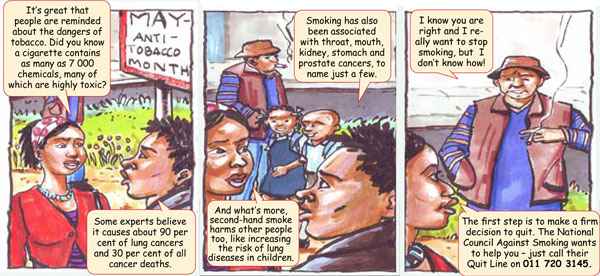
For more information, call the National Council Against Smoking Quit Line: 011 720 3145 or send a fax to 011 720 6177 or visit: National Council Against Smoking
Kidney disease: early detection saves lives
Kidney disease: early detection saves lives sadminKidney disease or failure kills at least 10 000 South Africans every year, according to the National Kidney Foundation of South Africa.
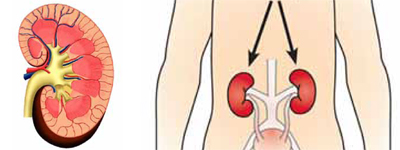 Although we don’t give them a second thought, kidneys are among the most important organs in the body, constantly working to remove deadly toxins.
Although we don’t give them a second thought, kidneys are among the most important organs in the body, constantly working to remove deadly toxins.
The two remarkable bean-shaped organs about the size of a fist, manufacture important chemicals for the body, retain the substances we need to be healthy and eliminate toxic waste from the body via urine. The waste and extra water are processed into urine, which travels via tubes called ureters to the bladder.
If the kidneys are damaged or do not function properly, it can result in kidney disease.
The silent killer
Kidney disease is sometimes known as the “silent killer” because it often develops gradually, without giving the sufferer any warning - until the kidneys are irreparably damaged.
In most cases the deterioration of the kidneys is relatively slow. This is called chronic kidney disease. If the decline in the kidneys is not picked up by healthcare professionals early enough, they may be permanently damaged.
Kidney failure occurs when there is a complete or nearly complete loss in the functioning of the kidneys. Once the kidneys are damaged they start to lose their functioning, with the body becoming poisoned by the toxins and wastes that build up. In serious cases the patient will need regular dialysis - a medical procedure where a machine is used to remove toxins from the blood - or a kidney transplant.
Manageable condition
Kidney disease cannot be cured. However, if this medical condition is diagnosed early and properly treated, it can be controlled and further damage to the kidneys prevented. It is important to identify the condition as soon as possible.
Why do kidneys fail?
The kidneys may be damaged and start to fail for a number reasons including:
- Certain infections and illnesses.
- Recurring kidney stones or bladder infections.
- Trauma or accidents.
- Toxins.
- Certain cancers and cysts.
What are the signs of kidney disease?
- Swelling of the body.
- Shortness of breath.
- Weakness.
- Poor appetite.
- Insomnia (sleeplessness).
- Body aches and pains.
- Impairment of thought processes.
- Headaches and high blood pressure.
If you display any signs of these symptoms, you should see your doctor immediately.
Tips to prevent kidney disease:
- Good nutrition. By ensuring that you eat a balanced, nutritious diet you can help prevent kidney disease.
- Quit smoking. Smokers are three times more likely to have reduced kidney function.
- Limit your alcohol intake.
- Drink plenty of water. This will help the kidneys in flush out harmful toxins.
- Exercise. It can reduce your risk of developing heart disease and diabetes that in turn can increase the risk factors for kidney disease.
Sources:
eMedicineHealth
Medlineplus
National Kidney Foundation of South Africa
National Kidney and Urologic Diseases Information Clearinghouse
Gauteng school goes for a tablet a day
Gauteng school goes for a tablet a day sadminPrinted textbooks in South Africa could soon be a thing of the past, if Sunward Park High School is anything to go by.
 The Gauteng school is leading the revolution to a better teaching and more efficient schooling system, by throwing out textbooks and bringing in computers instead.
The Gauteng school is leading the revolution to a better teaching and more efficient schooling system, by throwing out textbooks and bringing in computers instead.
The 1 200 learners at the school now use tablet computers to read the e-textbooks needed for their lessons.
The revolutionary e-learning initiative was launched by the Department of Basic Education in partnership with Modern Information Business (MIB) recently.
According to Basic Education Deputy Minister Enver Surty, e-textbooks give teachers and learners the ability to log onto a massive portal, which contains all the books they require for each subject.
This portal was created by MIB, a company that aims to use information communication and technologies (ICT) in education to empower South African communities.
Sunward Park, in Boksburg, is the first fullyfledged e-learning school in the country, while others are in the process of getting there.
According to Zakhele Sibeko, a teacher at the school, e-learning is what learners in the country need to prepare them for further studies at tertiary level.
“It makes life easier for us as well as the learners. All the information we need can easily be accessed from the educational portal provided,” he said.
“Through these tablets, learners can now explore different sources, download various information of the same content which has been taught in class, and can even explore more learning resource through the portal,” Sibeko added.
E-learning has also brought the fun back into the classroom, according learner Faith Makgoba.
“The e-textbooks in our classes has made learning easier and more fun,” she said. Makgoba added that the initiative had also saved her from carrying a school bag filled with heavy textbooks to school everyday.
“We can now access previous question papers, which will help us with our exam preparations. We also are no longer limited to the resources provided at the school. The tablets allow us to access all our e-learning subject material,” she said.
For the initiative to work, teachers needed to overcome their fear of technology, Deputy Minister Surty pointed out.
“Teachers need to embrace technology in teaching in order to make the ICT work. As a department, we have already digitised all our learning materials and this material is accessible from the Thutong portal (a hub on the department’s website that houses all learning and teaching material) to all learners and teachers in schools,” he added.
For more information contact the department on 012 357 3000 or go to www.education.gov.za
Get a head start on school enrolment
Get a head start on school enrolment sadminThe 2014 school year may be more than six months away but parents have been urged to start enrolling their children at schools immediately.
The application period for 2014 school enrolments has already opened in Gauteng and the Western Cape, the education departments in these provinces have announced.
If your child is entering school for the first time, starting high school or changing schools, you should apply as soon as possible.
The departments advise parents to apply at more than one school, as the application to the school of your choice may not be successful.
This year there will be two phases during which you can visit schools and apply for 2014 admissions.
Phase 1 takes place from 1 March to 21 June and Phase 2 takes place from 16 July to 6 September.
Schools are expected to reply to all Phase 1 applications by 28 June 2013 so that parents and guardians have enough time to look for alternative schools during Phase 2.
Early enrolments are important as they help plan for the year ahead, ensuring that departments allocate enough educators, textbooks and other learning support materials to schools.
When applying for enrolment, you must provide the school with the child’s birth certificate, immunisation card and transfer card, or the last report card for learners who have already been to school. Schools cannot charge fees such as a registration fee, deposit, re-admission, pre-admission testing fees, or any other fee at the time of application.
School fees may be charged only after the learner has been informed in writing of acceptance for admission to the school.
New hostel for Diyatalawa learners
New hostel for Diyatalawa learners sadminUntil now, learners from Diyatalawa farm in QwaQwa have had to walk long distances to get to the Majweng Intermediate School.
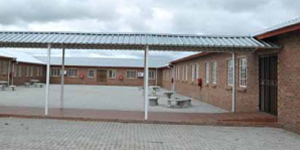 But with a new hostel set to open at the school, learners will be able to concentrate on learning instead of the journey to school.
But with a new hostel set to open at the school, learners will be able to concentrate on learning instead of the journey to school.
The Free State Department of Education built the hostel to accommodate learners from far-flung areas of Diyatalawa at the school.
The hostel will make the lives of Diyatalawa residents, like Matsie Motsoeneng, easier.
Motsoeneng is happy that she will no longer have to worry about her seven-yearold daughter, who is in Grade 2, walking for about two hours to get to school.
For as long as she can remember, Diyatalawa’s children have walked long distances, some as far as 12 kilometres to the Majweng Intermediate School.
It is a journey that Motsoeneng takes with her daughter every morning.
“On days I cannot take her to school, I worry because the distance she has to walk is very far. The hostel will make a huge difference to our lives,” she said.
The hostel was built as part of the Comprehensive Rural Development Project (CRDP). The CRDP promotes food security by facilitating land redistribution, creates business opportunities and expands opportunities for rural women, youth and people with disabilities.
Diyatalawa, due to its extreme poverty, was identified as one of the pilot sites for the project after President Jacob Zuma visited the area in 2009.
But it was only in 2011, when President Zuma returned to Diyatalawa to monitor the progress of the CRDP, that Motsoeneng and her neighbours told the President about the challenges their children faced to get to school.
The President then asked the Free State Department of Education to build a hostel for learners at the Majweng Intermediate School. The construction of the hostel, which cost R11.9 million, started in April 2012, said the department’s director of communications Howard Ndaba.
The hostel can accommodate 144 learners and also has a kitchen, laundry room and dining hall.
With water and electricity now connected, the hostel is ready for occupation.
“It is great that the government was able to complete the hostel so quickly. We are so happy to have this in our community. This hostel will make my daughter’s life so much better,” Motsoeneng said.
The department will provide food and accommodation to the learners. Housemothers and fathers have been appointed to look after the children while they are at the hostel. At the end of every school term and during long weekends, the learners will return to their homes, Ndaba added.
Currently there are 2 817 learners in the Free State living in 25 school hostels.
The department recently completed another hostel at the Kgotsofalo Intermediate School in Tierpoort near Bloemfontein, while another is expected be completed at the end of April at the Albert Moroka Secondary School in Thaba Nchu.
For more information contact the Free State Department of Education on 051 404 8000.
Innovative scheme turns farmworkers into farmers
Innovative scheme turns farmworkers into farmers sadminFrom the main road connecting South Africa and Swaziland, it’s a 2km drive on an uneven, rocky road to the Forbes farmhouse on Athole Farm.
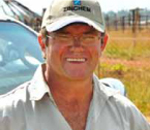 Located in a dense pine forest in Amsterdam, Mpumalanga, about 60km outside Piet Retief, roaring tractors, heavy machinery, mooing cattle and singing birds are familiar sounds on this 5 600 hectare property that farmer and physician Dr Colin Forbes calls home.
Located in a dense pine forest in Amsterdam, Mpumalanga, about 60km outside Piet Retief, roaring tractors, heavy machinery, mooing cattle and singing birds are familiar sounds on this 5 600 hectare property that farmer and physician Dr Colin Forbes calls home.
The coal-rich farmland has been passed down from the one generation of his family to the next since 1860, a number that is clearly visible on the front of the farmhouse just above the door.
Athole Farm is not only home to the Dr Forbes and his family. It is also home to over 60 families of farmworkers who have been living on the farm for generations. Just like Dr Forbes, the majority, if not all the workers were born, raised and are currently working on the farm.
In 2012, Dr Forbes took a major gamble when he started his own land reform project by turning his farm into a training centre for his employees.
He gave 10 percent of his 5 600 hectares to 34 workers to plant maize, soya beans and potatoes.
“I've always seen this as more of a swap than a donation,” he said about the initiative.
Dr Forbes has set himself the target of turning five of employees into commercial farmers in the next five years.
“In five years’ time, I will be happy with the successful emergence of perhaps five individuals from the entire group having made the grade of running an independent commercial farming operation.”
From the onset, he had confidence that he was doing the right thing.
“Though there are risks attached to any new venture, I have never had the view that this initiative could fail. My greater fear has been for the consequences of doing nothing proactive about land reform. This initiative enjoys full buy-in from me and the beneficiaries,” he explained.
One of the reasons he “swapped” the land with his employees is to allow them to benefit from land reform, to establish an ‘agri-village’ and to mentor them.
Forbes said his gesture was also a response to government’s call to assist with land reform.
“This is my pragmatic response to government’s call and I feel the responsibility to ensure that farmworkers on this farm and other farms in this country are not left behind in terms of enjoying the benefits of a democratic South Africa.”
Dr Forbes invested R238 000 of his own money to get the training off the ground. This money covered the costs of seeds, tools, fuel supply for tractors, fertilisers and pesticides.
A year later, Dr Forbes’s gamble paid off with a good harvest. Each of the 34 workers made a profit of R8 600 from their allocated land. They each had to pay Dr Forbes the R7 000 interest-free loan to cover the R238 000 he invested in the project.
“I am attempting to present a blueprint for achievable and replicable land reform to fellow farmers. I believe that it is only through the emergence of black commercial farmers that there can be successful land reform in this country,” he explained.
Dr Forbes called on other white farmers to embrace his land reform initiative.
“My message to other white farmers is that the time for being in denial about land reform is over and this is a plan that I think could work if implemented correctly.”
Dr Forbes's initiative has impressed the National Empowerment Fund (NEF), an agency of the Department of Trade Industry that supports and funds black empowered businesses.
Emmanuel Mohlamme, the agency’s spokesperson, said the NEF had visited and made an assessment of the farm.
Mohlamme added that initiative could be a worthy investment and the NEF would consider funding it if Dr Forbes approached the NEF for financial assistance.
Farmworkers dream big thanks to farmer’s support
Farmworkers dream big thanks to farmer’s support sadminAmos Soko, 32, has been living and working on Athole Farm in Amsterdam, Mpumalanga all his life.
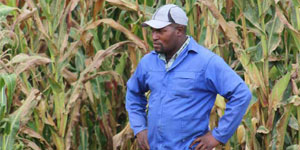 The farm is now set to play an even bigger role in the farmworker’s life thanks to a new project started by farm owner and doctor Colin Forbes.
The farm is now set to play an even bigger role in the farmworker’s life thanks to a new project started by farm owner and doctor Colin Forbes.
In 2012, Dr Forbes started a land reform initiative by swapping (as he puts it) 10 per cent of his farm, turning it into a training centre for his employees.
He provides mentorship and training in commercial farming, focusing mainly on aspects such as entrepreneurship and managing a farm.
As part of the project, Soko and other farmworkers jointly received 560 hectares of land from Dr Forbes.
Boasting 15 years of experience as a general worker on the farm, Soko now dreams of becoming one of the top five farmers in the country.
“I never thought that one day I will have my own land,” said Soko with a smile.
He became Athole Farm’s main herdsmen in 2008, taking care of more than 5000 cows. Working with Dr Forbes has taught him a lot about farming and Soko now wants to use that knowledge to turn his dream into reality.
“Over the years, we’ve learned how to plough the land but we had no clue about how the farming business works. Now we know more and we are willing to learn even further. We made some money in the last year’s harvest. We are starting to see some direction and we are very encouraged,” he said.
Another farmworker to benefit from the initiative is Thulani Madonsela, who has been working in the farm since 1993.
Madonsela said if other established farmers followed Dr Forbes example the lives of many farmworkers would change. Government would also be assisted in dealing with the challenge of land reform, he added.
Dr Forbes is hopeful that government will buy the land from him and give it to his employees as part of its land reform efforts.
Should this happen, he plans to use 75 percent of the money to build decent houses for the workers.
Skills boost for Mpumalanga cotton farmers
Skills boost for Mpumalanga cotton farmers sadminMpumalanga cotton farmers got the opportunity to brush up on their skills thanks to a partnership between Cotton SA and the Mpumalanga Department of Agriculture, Rural Development and Land Administration.
Cotton SA, with the support of the department, facilitated skills training for cotton farmers in Nkomazi recently.
The four-week programme consisted of 10 unit standards, representing 43 credits and was grouped into four modules - pre-plant activities (financial management), field preparations (establishment, nutrition and moisture needs), pest (insect) management and preparations for harvesting.
Farmers who successfully completed the course were awarded certificates.
Robert Nkalanga, a cotton farmer and chairperson of the Nkomazi Farmers Association, said the programme would be of great benefit to the farmers as it had increased their knowledge of cotton production.
The department’s director of district services: Ehlanzeni south, Oneday Magagula, congratulated the cotton farmers on their accomplishment.
The department was hopeful that there would be a memorandum of understanding between itself and Cotton SA to ensure that the lives of cotton farmers were improved, he added.
Hennie Bruwer, of Cotton SA, applauded the initiative and thanked the farmers for their commitment and hard work during the course.
“Training is an ongoing process that will never end … farmers have to come back all the time to be trained and refresh courses, in order to become better farmers.
“You can’t stop training, it is the cornerstone of development. You train them properly so that they know what to do in financing, soil preparation, harvesting and marketing,” he added.
*Celani Ndude works for the Mpumalanga Department of Agriculture, Rural Development and Land Administration.
Talk about rape to protect children
Talk about rape to protect children sadminTo mark Child Protection Week, Child Welfare South Africa (CWSA) has embarked on a campaign to educate young boys about rape.
Child Protection Week runs from 27 May to 3 June. It serves as a battle cry to rally all South Africans against child abuse.
CWSA has emphasised the need to educate young boys about rape following the increase in sexual abuse and violence committed by minors against other minors.
“We have designed a community-based Boy Child Programme to assist, guide and support boys to engage in proactive and constructive behaviour in becoming sexually and morally responsible as nurturers and caregivers,” says CWSA national training manager Shamien Rugunandan.
CWSA provincial offices will run the programme throughout the country.
During Child Protection Week, South Africans are encouraged to wear a green ribbon to show their support for the rights and protection of children. Green signifies life, growth and nurturing.
The aim of child protection programmes is to highlight the rights, safety and protection of children, says Rugunandan.
“Children in South Africa are often faced with challenges ranging from poverty, physical, emotional and sexual abuse to negligence. It is disturbing that most of the offenders or suspects in recent rape cases are children themselves.” Rugunandan says it is important for communities to work together to protect vulnerable children.
She adds that the Children’s Act compels members of the community to report any act that compromises the safety of children. The abuse of a child must be reported immediately to social workers or police and the child must immediately be removed from danger.
CWSA is calling on leaders, who display values of integrity, responsibility, morality and accountability in their personal and professional lives, to become mentors. Such leaders will be good role models for young boys, Rugunandan points out.
To become a mentor call CWSA on 011 452 4110 for application forms.
You can also contact Childline on 0800 055 555 to get more details about their initiatives.
For more information on CWSA and Child Protection Week go to Child Welfare SA
How to tell if a child has been abused
How to tell if a child has been abused sadminAbused children often display behavioural, physical and emotional signs of abuse. Child Welfare South Africa identified a few indicators and signs that could indicate that child that is being abused. The child needs to be assessed by a professional and an investigation must be done looking at all factors.
Physical signs
- The most obvious signs to show that a child suffers abuse are physical signs such as marks on the body, bruises, cuts or burns.
- A child may also have difficulty walking, sitting or performing other simple tasks due to soreness.
- Weight loss may also be a sign of neglect. However, an overweight child may be overeating due to emotional problems or to hide the pain.
Emotional signs
Emotional signs of abuse may be evident in the personality of the child. These include:
- Distrust, excessive efforts to please, shyness or introversion (e.g. playing alone).
- Excessive fighting, being extremely withdrawn or bullying others.
- Behaviour that is attention seeking, such as crying excessively or inappropriately.
- Not getting along with others.
- Being tired often or having frequent nightmares.
- Drug abuse or addiction in the child or parent.
- Missing school, failing grades or underachieving
- Self–destructive behaviour, such as suicide attempts or self- mutilation.
South Africans warned off counterfeit goods
South Africans warned off counterfeit goods sadminThe price of a pirated DVD at the side of the road might seem appealing, but giving in to the temptation to buy it makes you just as guilty as the illegal vendor.
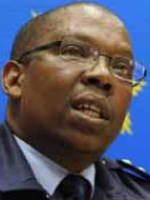 That was the warning from Gauteng’s Police Commissioner Lieutenant- General Mzwandile Petros recently, when police destroyed thousands of counterfeit goods in the province.
That was the warning from Gauteng’s Police Commissioner Lieutenant- General Mzwandile Petros recently, when police destroyed thousands of counterfeit goods in the province.
He appealed to South Africans to rather go to a legitimate retail store for genuine articles - whether it was a DVD, CD or clothing.
Piracy was a crime against the country’s economy, negatively affecting the economic growth of the province and country, Lieutenant- General Petros said.
Counterfeit goods and about 294 000 DVDs were destroyed by Gauteng police.
Jacques Allers of the South African Federation Against Copyright Theft, stressed the importance of partnering with the police to fight piracy.
“Our partnership with the police has resulted in the reduction of piracy which, in the past, was common business on the streets. Many artists are left poor because their efforts are stolen and sold cheaply on the streets,” said Allers.
Eugene Mthethwa of the famous Kwaito group Trompies said that he stopped doing what he used to do best because of the high rate of piracy in the country.
“Piracy killed the love I had as an artist. I now do a nine-to-five job to support my family because the music industry is under a dark cloud of piracy,” he said.
Mthethwa, who was a victim of crime recently when his house was broken into, also praised the men and women in blue for their hard work and called for them to be taken care of.
“These men and women [police] need to be looked after like any other citizens. Before they wear their uniform, they are mothers and fathers who are loved by their families. We need to stop police killings,” he added.
More than 3 000 illegal guns and knives were also destroyed in Vereeniging, making Gauteng a little bit safer.
AK-47 rifles, shotguns, rifles, pistols, revolvers and homemade firearms were among the weapons that went into the smelters.
* Capt MK Marumo works for SAPS.
AIDC opens doors for female artisans
AIDC opens doors for female artisans sadminThe automotive sector may be seen as a man’s world but Soshanguve resident Nelly Nekokwane is determined to make her mark on it.
 Nekokwane is currently in Dubai, expanding her knowledge about making car parts, thanks to the Automotive Industry Development Centre (AIDC).
Nekokwane is currently in Dubai, expanding her knowledge about making car parts, thanks to the Automotive Industry Development Centre (AIDC).
After completing N6 in civil engineering at the Johannesburg Technical College in 2011, Nekokwane could not find a job.
Last year she saw an advertisement by the AIDC, calling for young women with an interest in the automotive sector to apply for a two-year training programme.
The AIDC is a subsidiary of the Gauteng Growth and Development Agency, which is an agency of the Gauteng Provincial Government. It was established to increase the global competitiveness of the South African automotive industry by focusing on enterprise development, skills development and training.
Applicants for the training programme had to have passed mathematics, physical science and English in matric.
Nekokwane applied, was accepted and is now among 32 young women receiving training related to the car manufacturing sector at a Motherson Sumi Systems Limited’s manufacturing plant in Sharjah, Dubai.
Motherson Sumi Systems Limited is a global leader and the largest automotive component manufacturer in India.
The women left for the training programme in March.
Nekokwane is excited that she was selected.
“When I did not qualify to get into university I realised that it was not the end for me, there were other options. It was especially important for me to have a career in scarce skills so I could help develop the country. I am very happy for this opportunity and hope that government will continue to make such opportunities available for women.”
Nekokwane said that while it was tough being unemployed, she knew she had the skills to become an artisan.
She was also excited about being in a new country and receiving valuable experience and exposure in the automotive industry.
The women will receive training in vehicle component manufacturing and cable harness. Cable harness, also known as a wire harness and wiring assembly, is the assembly of cables or wires, which transmit signals or electrical power.
AIDC CEO Barlow Manilal hoped that on their return, the women would help turn Gauteng into a hub of automotive manufacturing.
“We are actively involved in building a talent pipeline within the youth of Gauteng to meet industry needs. This initiative will have a positive effect on skills, development and training in the automotive sector in general.”
He added that the youth would benefit from the course by receiving training at an international level.
Gauteng MEC for Economic Development Nkosiphendule Kolisile said the initiative was aimed at ensuring that young women from disadvantaged backgrounds were empowered with skills and training to enhance their career opportunities.
“It also presents us with a unique opportunity to transform the automotive industry, which is still a male dominated industry. It also bears testimony to the Gauteng Provincial Government’s commitment to young people in this province,” he added.
For more information on the AIDC, contact its industry development manager Dineshan Moodley on 012 564 5285 or email dmoodley@aidc.co.za
Ekurhuleni on massive job creation drive
Ekurhuleni on massive job creation drive sadminThe Ekurhuleni Metropolitan Municipality (EMM) will invest more than R283 million in job creation initiatives that is expected benefit young people in the municipality. This investment is expected to create more than 5 000 work opportunities, the municipality’s Executive Mayor Mondli Gungubele announced recently.
Each of the 100 wards in Ekurhuleni will receive a cash injection of R1 million.
“It is envisaged that through this financial investment, the EMM will contribute to the creation of an additional 5 500 work or income earning opportunities in the regional economy,” said Gungubele.
He added that the municipality would invest in diverse initiatives to create the targeted jobs.
“We have secured the commitment of all stakeholder departments to increase their job creation targets significantly. In our endeavour to remain true to our realities on the ground, the EMM has taken a conscious decision to invest its financial resources towards job creation.”
However, he was quick to point out that fighting unemployment was a mammoth task and there were no easy solutions.
“I am the first to acknowledge that given the magnitude of the problem confronting us, the number of jobs created seems like a drop in the ocean. But the impact these jobs have had on the livelihoods of families cannot be undermined.
“I am certain that those who have been beneficiaries of these initiatives can testify to the huge difference these opportunities have made in their lives and those of their families,” Gungubele added.
The municipality will invest in the following posts and initiatives:
- Emergency Management Services (EMS): 200 Fire Brigade Reserve Force at a cost of R25 million a year.
- EMS: 219 hydrant maintenance, marking and testing marshals at a cost of R38 million a year.
- Ekurhuleni Metro Police Department: 1 010 Metro Police Peace Corp volunteers at a cost of R78 million a year.
- Economic Development: Youth Work Readiness Programme at a cost of R15 million a year.
- Economic Development Graduate Placement Programme at a cost of R15 million a year.
- Economic Development: Recognition of Prior Leaning Programme at a cost of R6 million a year.
- Economic Development Business Mentorship Programme at a cost of R5 million per a year.
For more information contact the EMM on 086 054 3000.
Correctional Services gets youth working
Correctional Services gets youth working sadminThe Department of Correctional Ser vices (DCS) has employed 2 954 unemployed youth in the past two years through its learnership and internship programmes.
 One of those is 32-year-old Bongani Radebe, who says the one-year learnership programme has changed his life forever.
One of those is 32-year-old Bongani Radebe, who says the one-year learnership programme has changed his life forever.
Learners spend the first six months doing basic training either at Zonderwater or Kroonstad Correctional Services College and the other six months doing practicals at a correctional centre.
Radebe was absorbed into the department in March this year and has been placed at the Boksburg Medium Correctional Centre. Before the learnership programme at the department’s Zonderwater College, he worked as a packer at a retail store.
“Joining Correctional Services was a life changing experience. Before I joined I knew very little about the intricacies of looking after offenders. I am glad I chose this route because now I contribute fully towards the safety and security of all people by ensuring that offenders are safely in custody,” he said.
One of the most fascinating discoveries for him was the many career options available at the DCS. Given these options, Radebe was encouraged to further his studies while working.
Of the 2954 learners, 943 did their learnership in 2011/12 and were absorbed into permanent positions in March 2012, 654 were absorbed in March 2013 and a further 1 006 interns appointed in August are currently in the system, acquiring experience that will enhance their job prospects.
In addition, inmates are also being encouraged to read, study and work as part of their rehabilitation. As a result, several inmates have been equipped with skills including baking, carpentry and bricklaying. These inmates have received certificates on their release from correctional centres.
Correctional Services Minister Sibusiso Ndebele stressed that education was one of the top priorities of government.
“We are in need of dedicated, patriotic and action-oriented young intellectuals, who will contribute to building the kind of prosperous and successful society we envisage.
“This is a society without poverty and under development, where men and women, girls and boys live in dignity with access to opportunities to make their lives better and meaningful,” he said.
The DCS’s Learnership Programme is one of the pillars of the National Skills Development Strategy. It not only generates skills but also helps alleviate poverty and unemployment.
The Minister said the work correctional officials were expected to do required a special calibre of person.
“Not everyone has the personality traits necessary for success in the field of corrections. Correctional officials must have several personality traits, in order to deal with inmates and handle the stress of long hours in an institutional environment. One of the most important traits for a successful correctional official is tact, or sensitivity, in knowing how to interact with others,” he added.
* Molatelo Mokumo works for the Department of Correctional Services.
Internship exposes youngsters to world of work
Internship exposes youngsters to world of work sadminDutywa resident Vuyiseka Mboxela is gaining valuable experience in the media and communications field after earning herself an internship with the Eastern Cape Department of Transport.
 The 28-year-old had been unemployed since she graduated from the University of Fort Hare with an Honours degree in Communications in 2011.
The 28-year-old had been unemployed since she graduated from the University of Fort Hare with an Honours degree in Communications in 2011.
But now she is being exposed to the working world as an intern in the department’s communications directorate at the head office in King William’s Town.
“It was hard looking for a job after completing my studies. I am very grateful to have received this opportunity in the Public Sector. This opportunity will help me enhance my skills and understand how the Public Sector functions. It will also enable me to interact with different people and to inform my community on how government works,” said Mboxela.
Her internship started at the beginning of April after Transport MEC Thandiswa Marawu announced that 84 new interns would be placed in the department to gain work experience and address the skills shortage.
The interns have been placed in the department’s district offices across the province. Mboxela added that the internship would boost her confidence, giving her the opportunity to apply all the theory she had learnt at university.
“An internship builds your confidence on how to apply what you have learnt at school. It’s not only about the skills but also about knowing and understanding what your career entails,” she pointed out.
The department’s human resource director Linda Bovana urged the interns to make the most of the opportunity they had been given. She encouraged them to learn as much as they could during the internship.
The interns will be placed in sections relevant to their qualifications. This includes risk management, finance, human resource, transport administration and licensing, information technology, communications, traffic control and supply chain management.
The internship lasts for a year, during which time interns will be assigned to mentors who will be responsible for coaching them.
The next intake of interns is scheduled to take place after 12 months.
For more information on the internships contact the department’s human resource development unit on 043 604 7400 or 0800 644 644.
Local artisan to show off skills at global competition
Local artisan to show off skills at global competition sadminCape Town teenager Marvin Lottering will venture out of the country for the first time in July to represent South Africa at an international artisans competition.
 His skills in drywall systems and plastering have earned him a place at the WorldSkills International Competition to be held in Leipzig, Germany. Lottering, 19, beat off stiff competition from other up-and-coming artisans in the regional and national competitions organised WorldSkills SA and supported by the Manufacturing, Engineering and Related Services Sector Education and Training Authority (merSETA).
His skills in drywall systems and plastering have earned him a place at the WorldSkills International Competition to be held in Leipzig, Germany. Lottering, 19, beat off stiff competition from other up-and-coming artisans in the regional and national competitions organised WorldSkills SA and supported by the Manufacturing, Engineering and Related Services Sector Education and Training Authority (merSETA).
Lottering is currently doing his National Certificate in Metal and Engineering Manufacturing Processes NQF Level 3 at the Saint-Gobain Construction Products Academy in Cape Town.
His studies are part of a learnership programme accredited by merSETA.
Lottering is ecstatic to have made it through all the regional and national competitions, emerging as the overall winner who will represent South Africa.
“I am very happy and excited to be representing my country, especially since it will be the first time that I will be travelling aboard,” he said.
Lottering said he has always enjoyed working with his hands and once he has completed his course he would like to start his own business.
Andre Vermeulen, a technical delegate with WorldSkills SA, explained that aim of the organisation was to boost the standard and status of vocational education and training both locally and globally.
WorldSkills SA invited training providers, businesses and colleges to enter participants under the age of 23 into the local the competition.
Vermeulen explained that the competition judged skills in construction and building technology, creative arts and fashion, information and communication technology, manufacturing and engineering technology, social and personal services, transportation and logistics.
Participants were expected to apply what they were currently learning during the competition.
He said based on response received, local and regional competitions were held to select a winner from each region or province to partake in the national event, at which Lottering came out tops.
Lottering will be mentored by various experts including industry experts, physiologists and nutritionists in preparation for the international competition.
NYDA has entrepreneurs flying higher
NYDA has entrepreneurs flying higher sadminDetermination and hard work are some of the characteristics that have driven Neo Kuaho and Khensani Peters to succeed.
The two are among 25 entrepreneurs chosen by the National Youth Development Agency to jet off to the United States, Germany, Italy and Spain for six weeks of business mentorship training in May, as part of the Young Entrepreneurs Programme (YEP).
The aim of the programme is to provide opportunities for young business owners to acquire business skills and knowledge and to learn business theory through workshops, lectures and online training, giving them the skills needed to grow their businesses.
Neo Kuaho
 Kuaho is managing partner of Letshoao Consulting and founder of the Youth Development through Investigation and Dissemination of Information (YDIDI). YDIDI is a platform used by Letshoao Consulting and Y-FM to collect, investigate and distribute information to the youth and businesses. The aim of the initiative is to provide the youth of South Africa with information on career opportunities.
Kuaho is managing partner of Letshoao Consulting and founder of the Youth Development through Investigation and Dissemination of Information (YDIDI). YDIDI is a platform used by Letshoao Consulting and Y-FM to collect, investigate and distribute information to the youth and businesses. The aim of the initiative is to provide the youth of South Africa with information on career opportunities.
Kuaho, who is from Soweto, spent his childhood in Chavhani in the former Northern Trasnsvaal. He attended Edendale Primary School and matriculated from Westridge High in 1999.
He then studied software development information technology at the Tshwane University of Technology.
While on campus, sporting funky dreadlocks, his flair for fashion and uncanny ability to talk his way through just about anything, landed him a few odd jobs that helped him pay his way through university.
He began teaching new students the basics of information technology and programming and soon landed a job as assistant to the head of department. In his final year of study, he received an internship at Ernst and Young as a quality analyst.
Kuaho then joined Lexpro Stelsels in Pretoria, as the company’s first black programmer. There he developed and maintained software for attorneys, trained and equipped clients in basic computer literacy and software skills, and sold and marketed software to emerging black-owned law firms.
He eventually landed the company accounts of two of the biggest black-owned law firms in Pretoria.
Because of his outstanding achievements, he was approached by the company’s CEO to start up and operate Letshoao Consulting, a baby company of Lexpro Stelsels.
While managing the company and the woes that came along with it, he conceptualised YDIDI.
“Little did I know that this idea would grow its own legs and be a modern-day revolution of some sort,” he says.
The idea of helping thousands of unemployed youth came about while Kuaho was in a taxi on the way to work. He bought The Star newspaper and stumbled across an advert in the business section inviting Grade 12 learners to apply for a bursary and training in IT worth R65 000 with a guarantee of employment after training.
“As I sat there in the taxi trying to recollect if any of my friends had siblings with whom I could share this opportunity, it dawned on me that this opportunity would surely be missed by most of the people for whom it was targeted.
“I mean how many minimum wage earning parents or disadvantaged youths actually read the business section of The Star – especially the share prices section, let alone buy the paper?”
That’s when the idea of creating and circulating emails about jobs, bursaries, business and opportunities for the unemployed and disadvantaged youth was born.
He decided to start a platform that would research, investigate and distribute opportunities to as many media platforms as possible.
After three hours at the office he had researched how to draft a winning proposal, created one and sent it to Y-FM. An hour later he received a call from the radio station, which loved the idea and wanted to start a programme as soon as possible.
The first YDIDI show was aired on 25 April 2009. Since then YDIDI has helped hundreds of youths obtain bursaries, internships, learnerships and find employment, while others have received lucrative contracts for their businesses.
Besides producing and co-hosting the YDIDI show, Kuaho manages Letshoao Consulting which provides a range of services such as software application solutions, business development strategy and mentors youth in business.
He is also a motivational speaker and was recently appointed to develop and manage the Y-Business Elevator, a CSI initiative aimed at incubating young businesses and accelerating their road to profitability, sustainability and success.
For more information on YDIDI, catch the show on Y-FM every Saturday between 8am and 9am or visit the YDIDI website
Khensani Peters
 Peters, 34, took the risk of a lifetime by giving up her steady job to pursue her passion of baking and hasn’t looked back since.
Peters, 34, took the risk of a lifetime by giving up her steady job to pursue her passion of baking and hasn’t looked back since.
Peters worked as a computer programmer for six years but felt like she needed a new challenge. She loved baking from a young age but never imagined she would one day sell her own creations.
Nonetheless, Peters decided to test the market by selling her homemade cakes at the office tuckshop.
“I would drop off a few cakes, three dozen scones and a batch of muffins at the tuckshop each morning and when I’d check back at the end of the day, everything would be sold out. It was encouraging to go home with empty Tupperware, knowing that someone had bought and enjoyed what I’d whipped up,” she says. Peters toyed with the idea of starting her own baking business but didn’t want to give up her steady job that also came with a steady pay cheque so she baked in her spare time.
“At the end of every month, I’d use what was left of my salary to buy the equipment I needed – the first piece I bought was a Kenwood major mixer for R3 000.”
Gradually, Peters began filling her kitchen with appliances and had a good collection of faithful, flop-proof recipes from family and friends. However, she admits her cake decorating skills needed work.
“A friend told me about Hilda Kemp, owner of Hilda’s Cakes. I contacted her and she agreed to share her secrets with me. I resigned from my job and for three months devoted my time to decorating cakes under her mentorship.”
Peters was finally ready to launch her business - Ntshovelo Cakes. Word of mouth really worked and soon orders were streaming in. She now bakes cakes for a variety of occasions from weddings to baby showers.
She currently employs one person but is looking at getting a bigger premises and hiring more staff to help with the orders.
Peters bakes cakes full-time from her home in Midrand, Gauteng and even though she sometimes works 24 hours a day she loves what she does.
Her dream is to open a coffee shop where people chat about the cakes they would like her to create. Her advice to young entrepreneurs is simply: “Don’t get into debt by taking out loans. Start small and buy equipment and stock as you grow”.
Being chosen as a YEP candidate is a dream come true for Peters.
“I have always wanted to go overseas and this programme gives me the chance to interact with business leaders and mentors from more advanced companies. It will allow me to learn a lot of new techniques and discoveries within my industry and bring the technology and skills back home where I can apply it to my business and teach young and upcoming cake decorators and makers as well,” says Peters.
For more information on Khensani Peters visit her website.
dti helps fishermen cast nets further
dti helps fishermen cast nets further sadminSmall-scale fisheries on the West Coast are poised for economic revitalisation, thanks to the Department of Trade and Industry’s (dti) investment of more than R11 million for fishing in the region.
The funding has been made available through the dti’s Fishing Cluster Project.
The main goal of the project is to create a sustainable fisheries industry by putting in place support measures to help create jobs and income generating opportunities.
As part of the project, Trade and Industry Minister Rob Davies recently handed over fishing boats to the value of R1.6 million to fishing cooperatives in Ocean View and Masiphumelele.
“The boats that we are handing over can enable this community to generate R1.8 million in a year. We want communities to be able to provide for their families and communities. Our aim with such projects is also to broaden the participation of small-scale fishing communities to higher commercial value activities,” said Minister Davies.
The Minister added that another purpose of the Fishing Cluster Project was to assist small businesses, such as cooperatives and small-scale fisheries, to achieve their maximum productivity in the commercial fishing sector.
So far 39 cooperatives have been funded to the tune of more than R11 million.
Minister Davies said that these funds provided cooperatives with a much-needed asset and capital base to begin trading competitively.
Mancaeta Nkululeko, who is the chairperson of Sinethemba Fishing, said the boats they were using previously posed many problems for the fishermen.
They were unsafe, could not accommodate many fishermen and did not allow them to go deep into the sea, he explained.
“Our lives are now safe with this new boat. We will now go deeper into the sea and catch more fish,” Nkululeko said.
Fresh faces for NYDA board
Fresh faces for NYDA board sadminYouth matters
New blood has been injected into the National Youth Development Agency (NYDA) with the appointment of seven new board members.
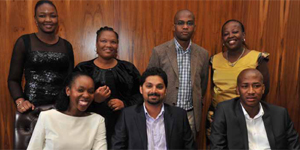 The new members, who will serve the agency for the next three years, were appointed by President Jacob Zuma.
The new members, who will serve the agency for the next three years, were appointed by President Jacob Zuma.
They officially started their tenure on 1 April 2013.
Introducing the new members recently, Deputy Minister in the Presidency for Performance Monitoring and Evaluation Obed Bapela said he hoped the new leadership would use their talent and knowledge to help government make the NYDA an inspiration to young people.
Deputy Minister Bapela noted that 54 per cent of the population was under the age of 35. This group, he said, had to deal with pressing challenges such as high unemployment.
“We hope that this young leadership will be able to inspire a sense of hope. We also spoke to them [during the meeting] about ensuring a clean administration, that the audit queries are minimised so that they can be in a position to give confidence not only to the young people, but to the entire society of all South Africans,” he said.
New NYDA chairperson Yershen Pillay said the board members were honoured by their appointment.
He was confident that they would be able to take the agency forward and address the many challenges facing young people.
“We hope to go to a strategic planning session to identify what the new vision, goals and objectives for NYDA [should be] as a collective.”
Pillay said their immediate focus would be on important issues including health, social cohesion and youth service.
“We understand the enormity of the task and hope to restore the credibility to the organisation, gain the public confidence that is in need and through that, create many opportunities for as many young people in the space of three years,” he added.
Board member Nyalleng Potloane, from the Free State, represents youth living with disabilities.
“I’m looking for social cohesion, how disabled people can love their country by having zero poverty, zero inequality and zero disempowerment and development for all of us. I need to represent them in NYDA programmes and make sure they are included, and teach people how we can develop together and make disabled people more visible,” said an optimistic Potloane.
Other board members are Xoliswa Bambiso, Mothupi Modiba, Zandile Majozi, Maropene Ntuli and deputy chairperson Kenny Morolong.
For more information contact the NYDA on 0800 525 252.
Make youth work professional, Minister urges
Make youth work professional, Minister urges sadminYouth matters
South Africa wants to see more of the work done with young people being professionally recognised, Minister in the Presidency for Performance Monitoring, Evaluation and Administration Collins Chabane has said.
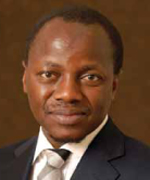 Speaking at the opening of the Commonwealth Conference on the Education and Training of Youth Workers recently, Minister Chabane said: “Given the huge challenges faced by young people in the country and across the globe, it was important to ensure that anybody who works with young people should be competent and skilled, with the required expertise to effectively address their needs and challenges”.
Speaking at the opening of the Commonwealth Conference on the Education and Training of Youth Workers recently, Minister Chabane said: “Given the huge challenges faced by young people in the country and across the globe, it was important to ensure that anybody who works with young people should be competent and skilled, with the required expertise to effectively address their needs and challenges”.
South Africa’s National Youth Policy defines youth work as “a field of practice that focuses on the holistic development of a young person, enabling the realisation of youth development via a combination of focused strategies”.
The Minister said international best practice showed that the professionalisation of youth work had many benefits.
“These included strengthening the capacity of youth workers to develop and deliver value added youth development services and empowerment, and providing professional quality services to the youth.”
The Commonwealth has over the years been promoting education and training of youth workers. In addition, there has been support for this process through the Commonwealth Diploma in Youth Development offered by institutions of higher learning in some Commonwealth member countries.
“However, it is important to note that, despite progress made, there are still challenges that are worthy of attention, particularly in the realisation of professional recognition of youth work,” said Minister Chabane.
He stressed the importance of countries coming together to share experiences and identify the common challenges as well as solutions to advance youth work.
Like many other countries, South Africa has also been on the road of professionalising youth work for quite some time.
“We therefore have lessons to share and we are equally open to learn from the wealth of experiences from our counterparts representing various countries in this conference. We hope that the lessons learnt from this conference will help deal with pertinent common issues facing youth workers globally,” said Minister Chabane.
UKZN’s solar-powered car shines bright
UKZN’s solar-powered car shines bright sadminYouth matters
After setting a new South African record with their solar-powered car, a team from the University of KwaZulu-Natal (UKZN) is now looking to conquer the world.
The students and lecturers from UKZN will take part in the World Solar Challenge in Australia in 2015, where cars powered by the sun travel a distance of 3 021km between Darwin and Adelaide.
On the local front, the eight students and two lecturers of the UKZN team put in a record breaking performance at the recent Sasol Solar Challenge, during which specially engineered solar-powered vehicles travelled across the country for two weeks.
“We achieved the furthest distance travelled in total by a South African team which was 2 136km,” said lecturer Kirsty Veale.
The team bettered the previous record, which stood at 1 096km by a significant margin.
Veale and Clinton Bemont, lecturers at the university’s mechanical engineering department, conceived the UKZN Apalis solar car as a final year design project in the School of Engineering under the Solar Energy Research Group.
Veale and her team spent six months designing and building the vehicle, with the help of sponsorships from the UKZN School of Engineering, The Technology and Innovation Agency, Unilever, Chemspec, Gochermann Solar Technology, Yamaha, Krank and Perry.
As the team put the car together, students learnt the importance of project and time management, coupled with industrial processes and manufacturing, Veale added.
Constructing the vehicle meant students were also exposed to electrical systems, control systems, vehicle design aerodynamics and structural design.
The car has a lightweight carbon fibre body and chassis supported by an aluminium and chromoly sub-chassis. It is powered by state of the art silicon solar cells, charging a bank of 464 lithium-ion batteries, which drive a high efficiency electric motor.
Veale was hopeful that the success of the project would create future opportunities for undergraduate and Master’s students to continue research into renewable energy methods and electric vehicles.
She added that renewable energy research was becoming an important part of UKZN research and that industries and communities were increasingly noticing the cost advantages of renewable energy resources.
“Although most have a large initial cost, the repayment over time is significant. It is important for communities to consider renewable energy methods as opposed to fossil fuels to reduce expense over time,” she added.
Workshop turns prisoners into artisans
Workshop turns prisoners into artisans sadminVocational training at the Boksburg Correctional Centre is skilling prisoners and preparing them for life outside the prison walls.
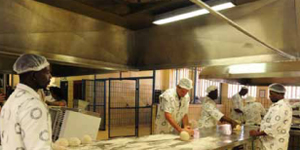 The prison has a workshop where inmates learn to bake, sew, as well as work with steel and wood. Here the hands that used to hurt, steal and kill are put to work.
The prison has a workshop where inmates learn to bake, sew, as well as work with steel and wood. Here the hands that used to hurt, steal and kill are put to work.
At the workshop, the rich aroma of freshly baked bread, coupled with the sound of drilling, fill the air.
Inmates are busy at the workshop, which is separated into different workstations for the bakery, woodwork, steelwork, upholstery, textiles, powder coating and spray painting.
Twenty-two men, dressed in white uniforms bearing a prison stamp, mix, roll and weigh dough in the kitchen.
A typical day starts at 6am when inmates start producing the first batch of 2 000 loaves of bread for the 5 000 offenders at Boksburg and Heidelberg Correctional Facilities.
It was while working here that Skhumbuzo Matiwane, 34, says he learnt patience and to control his temper.
Matiwane was convicted of house breaking in 2008 and has served four years of his 11-year sentence.
“After I completed matric I never found a job and I chose to steal. This is the first time in my life that I have had to wake up and go to work. It feels good and gives me a sense of accomplishment and purpose. A month after I was convicted, I was given an opportunity to do a course in the basics of bread making. I have never looked back.”
Matiwane says his skill will come in handy once he leaves prison.
“After I’ve served my sentence I would like to start my own bakery and contribute to society.” All the offenders working at the bakery have undergone accredited training in the form of a basic bakery course offered by Sasko, explains Gauteng Correctional Services spokesperson Ofentse Morwane.
By using its own facilities and labour to produce bread, Correctional Services saves about R2.4 million a year, Morwane adds.
Each inmate undergoes Occupational Health and Safety Training before they start work.
The Boksburg Correctional Centre Workshop is also accredited by the relevant Sector, Education and Training Authorities.
The workshop’s steelwork section makes palisade fencing, security equipment, prison beds and garden chairs.
These are sold to Correctional Services’ clients, which includes the South African Police Service and the Department of Water Affairs.
Here 44 offenders, in protective gear, are hard at work.
Jimmy Makwala, 34, proudly shows off the steel bed bases he has assembled. They will be sent to correctional centres around the country. He was arrested for armed robbery seven years ago and sentenced to 17 years imprisonment.
“I can now assemble about 20 beds a day. It’s very exciting to learn a new skill,” he says.
John Mthebe, 44, who is serving a life sentence for murder and armed robbery, works in the textile section, where about 1 000 prison uniforms are manufactured daily.
“When I came to prison I did not know anything about sewing. I am glad to have a skill. When I am released I will have something to fall back on and not commit a crime again. I would also like to urge the community to allow us back into society and welcome us. We have paid for our wrongs,” he says.
Lebo Luvuno, 27, who works in the woodwork and upholstery section, is optimistic about his future outside of prison.
“This skill that I have acquired no one can take it away from me. I didn’t know that there was so much I could do with my hands. When I leave prison I will look for a job save money for capital and then start my own company.”
Luvuno has completed seven years of his 15-year sentence for armed robbery.
Youth Day: rallying point to uplift the youth
Youth Day: rallying point to uplift the youth sadminAs we prepare to mark Youth Day in June, it is important to pay homage to the young people of 1976, but also to acknowledge and recognise the youth of the present.
 The fighting spirit of South African youth lives on not only in the memory of the Soweto Uprising but every day of every year.
The fighting spirit of South African youth lives on not only in the memory of the Soweto Uprising but every day of every year.
On 16 June 1976 more than 20 000 pupils from Soweto began a protest march for better education. In the wake of clashes with the police and the violence that followed during the next few weeks, approximately 700 hundred people, many of them youths, were killed and property destroyed.
One of those killed on 16 June was Hector Pieterson who Sam Nzima photographed being carried by another student while his sister ran beside them.
This celebrated picture would later come to symbolise the uprising and an in-your-face symbol of the ruthlessness of apartheid to the world. Considering this, I am convinced that the youth of 2013 are very different to the 1976 pupils who gathered in Vilakazi Street Soweto. But are they?
Young South Africans struggle tirelessly to create opportunities for themselves and their families.
Currently there are approximately 6.1 million young South Africans who are searching for some form of decent employment. Their hopes are often dashed by a labour market unable to absorb young, inexperienced workers.
Yes, the NYDA may have created more than 28 000 jobs in the last three years. Yes, the NYDA may have provided career guidance services to more than 1 million young people and provided over 110 bursaries.
Yes, the NYDA may have issued more than 33 000 loans to micro, small and medium enterprises. But the harsh reality is that these figures are but a drop in the ocean. Much more needs to be done. How much more though? Can the NYDA deliver more than the 6 million opportunities to those youth in need? No, it cannot, at least not in the next three years or even 10 years for that matter.
Ultimately the success of the NYDA and its programmes depends on the active participation of young people in their own development. More young people need to join the NYDA’s National Youth Service Programme and contribute to youth volunteerism.
More young people need to establish youth cooperative enterprises in their communities focusing on different areas of the economy. More young people need to become agents of change. With this in mind, I urge all government departments, private sector and civil society organisations to consider the youth of 1976 on Youth Day 2013, but keep the youth of 2013 at the fore of their reflections.
Consider the young person that has the capabilities to qualify as a chemical engineer, biochemist or marine biologist but has no resources to study or the high school pupil who is heading his or her household with four or five siblings to care and provide for.
As chairperson of the NYDA, every day for me is Youth Day and so it should be for everyone who needs to rally behind the youth of today.
* Yershen Pillay is chairperson of the NYDA board.
News in brief
News in brief sadmin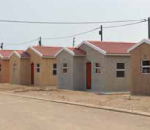 New housing project for West Rand
New housing project for West Rand
An old retirement village between Krugersdorp and Randfontein in Gauteng will be converted into a social housing development to provide shelter to 1 590 families on the West Rand. Through the Mogale Junction Social Housing Project in Mogale City, the Gauteng Department of Local Government and Housing will build units and houses to accommodate people who earn below R3 500 per month. In the first phase of the project, 480 units and 770 houses will be built. The province has also pledged R240 million to acquire 15 properties, which are well located for low income and affordable housing.
Gauteng gets public transport licensing centre
Gauteng MEC for Roads and Transport Ismail Vadi recently unveiled a new public transport licensing and registration office in central Johannesburg. The registration office will receive, verify and process applications for public transport operating licences. It also has a help-desk for public transport operators. The MEC also announced that his department would host a Taxi Consultative Summit in May to discuss the long-term sustainability of the province’s taxi industry.
New Procter and Gamble plant for SA
Consumer goods manufacturer Procter and Gamble (P&G) will build a R1.6 billion greenfield manufacturing facility in South Africa. Construction on the production plant will start in 2014, with first production expected in 2016. The company will create 500 new jobs, manufacturing products such as Head & Shoulders shampoo, Pampers nappies and Gillette shaving products for the local and export market. The location for the new plant has not yet been finalised.
Fixed dose combination ARVs rolled out
About 180 000 HIV positive patients have started on the Fixed Dose Combination (FDC) ARVs. Health Minister Dr Aaron Motsoaledi recently launched the FDC ARVs, which will initially be given to newly diagnosed HIV positive persons, HIV positive pregnant women and breastfeeding mothers. The FDC will eventually be rolled out to other HIV positive patients, after consultations with their doctors.
With the new pill, patients will now be taking one tablet once a day instead of three to five pills a day. The fixed-dose combination - containing emtricitabine, efavirenz and tenofovir - is a multiple antiretroviral drug combined into a single pill, which helps reduce pill burden.
Awards to recognise female scientists
You have until 17 May to nominate distinguished female scientists for the prestigious South African Women in Science Awards. The awards will be hosted by the Department of Science and Technology on 16 August as part of the department's celebration of National Women's Month. For more information and entry forms, visit www.dst.gov.za, email WISAwards@dst.gov.za or contact.
CDA board declares war on substance abuse
CDA board declares war on substance abuse sadminThe newly appointed Central Drug Authority (CDA) board has vowed to step up the fight against alcohol and drug abuse.
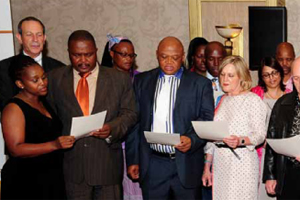 The CDA board will serve a five-year term, advising Social Development Minister Bathabile Dlamini on how to prevent, fight and treat drug abuse.
The CDA board will serve a five-year term, advising Social Development Minister Bathabile Dlamini on how to prevent, fight and treat drug abuse.
The board is tasked with carrying out the National Drug Master Plan (NDMP) of 2013 to 2017.
The NDMP serves as the country’s blueprint for preventing and reducing alcohol and substance abuse, the Minister said.
With the focus on prevention, the plan encourages collective, balanced, and researched interventions to inform policy and programmes.
Announcing the new board recently, Minister Dlamini said alcohol and substance abuse led to many social problems and that coordinated, ongoing efforts by all sectors of society were needed to deal with it.
“If we are to conquer this war, it will not be as a result of government action alone, but it will occur as a result of a coordinated national effort,” she pointed out.
The new CDA board consists of representatives from government departments, educational institutions and non-profit organisations.
Mokgotsi Kalaeamodimo, the newly appointed chairman of the board, vowed to fight the scourge of drug and alcohol abuse.
“Alcohol and substance abuse is a big problem for the whole world and we will make sure that all initiatives that have proven successful in the fight against substance abuse are supported.”
Kalaeamodimo has previously worked for the Department of Social Development as a director in substance abuse, the Department of Correctional Services in research and development and the Department of Justice and Constitutional Development in policy research and coordination.
Other members of the board are Peter Ucko, Professor Dan Stein, Angela Salter, Moses Gama, Hendrick Kruger, Collen Mpyane, Dr Eva Manyedi, Lethiwe Ndlovu, Carol du Toit, Dr Lee Rocha-Silva, Ray Eberlein, Johlene Ntwane, Jeffrey Nkosi, Mbusi, Dr Sadhna Panday, Peter Posthumus and Phezi Mabuza.
Nthabiseng Malefane, Frank Ledimo, Nomfundo Mahlangeni, Sesi Mahlobongwane, Mpho Nche, Susan Pienaar, Pelmos Mashabela, Sello Malaka, Sifiso Pakade, Prof Shabir Banoo, Hajira Skaal and Professor Tim Noakes are also on the board.
Minister Dlamini said the role of the board included advising government on emerging trends in alcohol and substance abuse, effective research and advice on prevention programmes.
dti hails SA’s top business achievers
dti hails SA’s top business achievers sadminBusiness people and companies that have made their mark in South Africa have been rewarded for their achievements at the prestigious SA Premier Business Awards.
The country's top business awards, hosted by the Department of Trade and Industry (dti), Proudly South African and Brand SA, took place in Sandton, Gauteng recently.
The awards recognise business excellence and honour enterprises, which promote the spirit of success and innovation, job creation, good business ethics and quality.
One of the top awards at the event, the Lifetime Achievement Award, went to entrepreneur and businessman Dr Richard Maponya.
He was rewarded for his significant contribution to the development of South African business, as well as his contribution to the community.
Dr Maponya is the first recipient of this award and has been hailed as a shining light in South African business.
He has been referred to as the ¡§father of black retail¡¨ and serves as an inspiration to young entrepreneurs across the country.
Dr Maponya's name is synonymous with enterprise and philanthropy. He has built his business into a force to be reckoned with, despite the restrictions of apartheid.
Among his many business ventures is the Maponya Mall in Pimville, Soweto.
Accompanying the award was the prize a bursary, valued at R110 000, which Dr Maponya will allocate to a business leader of his chose, who will attend the General Management Programme at the Gordon Institute of Business Science.
Other winners at the SA Premier Business Awards included:
- Rural Development Award: Social Change Assistance Trust.
- SMME Award: Malcom - Ezindaleni Hydraulics & Engineering (Pty) Ltd.
- Young Entrepreneur Award: Miss Earth South Africa.
- Women-Owned Enterprise Award: Segakweng Enterprise and Strategy Consulting.
- Quality Award: Coega Dairy.
- Technology Award: Tshwane University of Technology.
- Green Award: MTN SA.
- Media Award: Talk Radio 702/567 Cape Talk.
- Proudly South African Enterprise Award: G.U.D Holdings (Pty) Ltd.
- Most Empowered Enterprise Award: MTN SA.
- Investor Award: Nestle (South Africa) (Pty) Ltd.
- Manufacturer Award: Powertech and Bell Equipment Company SA (Pty) Ltd.
- Exporter Award: Abagold and Saab Grintek Defence (Pty) Ltd.
Celebrating SA’s freedom
Celebrating SA’s freedom sadminSouth Africa celebrated an important milestone recently, when the country marked Freedom Day on 27 April.
 The day commemorated the occasion in 1994 when for the first time, South Africans of all races exercised their democratic right to vote.
The day commemorated the occasion in 1994 when for the first time, South Africans of all races exercised their democratic right to vote.
The theme for this year’s celebration was: “Mobilising Society Towards Consolidating Democracy and Freedom”.
Government has made major strides in keeping the spirit of democracy alive in the country.
One of the symbolic moments in South Africa’s history was doing away with the old and raising a new flag in 1994.
Another came on Freedom Day in 2000 when the new Coat of Arms was unveiled.
Over the years, the country has come a long way in reclaiming its freedom, not only focusing on changing laws but also ensuring that the country’s citizens live in better conditions than they did under the previous government.
The results of Census 2011 paint the picture of a country where income levels have increased, the rollout of basic services has improved and education levels have risen.
Compared to before 1994, the country can now be proud of the fact that millions of people now have water, electricity, sanitation and housing.
However, many more are still waiting for these basic services.
To ensure that the lives of all South Africans improve, government has made the National Development Plan (NDP) the country’s roadmap for the future.
The NDP outlines the type of society the country is striving for by 2030, where no one is hungry, everyone is able to go to school and further their studies if they wish, work is available and all South Africans c a n m a k e a contribution because they have been provided with the necessary skills to realise full their potential.
However, government alone cannot build such a society. The involvement of all South Africans is critical to the success of the NDP.
Citizens must know their rights and responsibilities and actively participate in building the country.
The 2013 celebrations for Freedom Day and month took on special significance as the nation prepares to commemorate 20 years of freedom.
Some of government’s achievements over this period include providing the following services to South Africans:
Healthcare
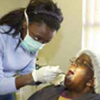
- Interventions made to improve the quality of life are yielding results. The overall life expectancy of South Africans has improved significantly between 2009 and 2011 to 62 years.
- The tide is turning in the fight against HIV/AIDS. By March 2012, more than 20.2 million people had undergone testing since the HIV Counselling and Testing campaign started in April 2010.
- South Africa has discovered a candidate drug to treat malaria. It has the potential to become part of a single-dose cure for all strains of malaria and may be able to block transmission of the parasite.
Rural development and land reform
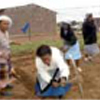
- Through government’s Comprehensive Rural Development Programme, people living in rural communities have been given the opportunity to overcome poverty.
- Since 2009, 1 306 346 hectares of land have been acquired and redistributed benefitting 1 942 789 people.
- The number of youth who served their communities through participation in the National Youth Service Programme stands at 138 990.
Job creation

- Employment grew by 327 000 (or 2.5 per cent) by the last quarter of 2012. Since the first quarter of 2011, employment has grown for seven consecutive quarters.
- Employment in the informal sector increased by 112 000, while formal sector jobs increased by 92 000 and jobs in the agricultural sector by 23 000 in the third quarter of 2012.
Access to basic services
 Households with access to water services increased from 92 percent to 94.7 percent.
Households with access to water services increased from 92 percent to 94.7 percent.- Households with access to sanitation services from 64 percent to 84 percent.
- Households with access to refuse removal services from 64 percent to 72 percent.
- South Africa’s social assistance programme (grants) has expanded from benefitting only 2.7 million people in 1994 to more than 16 million in 2012.
- The average time taken to issue an identity document has been reduced from about 150 days to about 30 days, while the average time taken to process an application for a social grant decreased from 30 days in 2010 to 21 days in 2012.
Garnishee orders: what you need to know
Garnishee orders: what you need to know sadminAn estimated nine million South Africans are currently in debt, according to the National Credit Regulator.
In addition, an about three million of all employed South Africans are in debt. South Africans, who are drowning in debt and falling behind with their payments, could find themselves on the receiving end of a garnishee order.
What is a garnishee order?
A garnishee order is a court order that is served by the sheriff (or messenger) of the court on the employer ordering the employer to make deductions from an employee’s salary or wage in settlement of a debt owed by the employee to a third party creditor.
A specified amount of money is deducted from the employee’s salary or wages each time the employee is paid until the debt owed by the employee has been paid in full.
A court will only make such an order when it is satisfied that there is a valid underlying debt, there has been a valid written consent to the order being taken or the court has previously made an order instructing that the debtors (employee’s) salary or wage be attached.
How much can be deducted?
The amount to be deducted from the salary or wage must be clearly set out in the garnishee order.
The judgment creditor (the person who lent the money) is able to claim the following:
- The full amount of the money loaned, less payments already made by the employee.
- Interest on the outstanding balance and costs incurred by the judgment creditor to collect the money.
- Sheriff’s fees.
Determining if a garnishee order is valid
A genuine garnishee order is an order by the court. It is served by the messenger of the court, also known as the sheriff, on the employer. The sheriff will show the employer the original order and a copy is left with the employer.
The original garnishee order must contain the following:
- A case number.
- A stamp from the clerk of the court.
- Signed by the attorney.
- Full name as well as identity number or staff number of the employee.
Employee’s rights
When a garnishee order is granted in respect of an employee, he is not without rights. An employee has the following rights:
- To dispute the amount claimed if it appears to be incorrect.
- To apply to court to reduce the amount of the order when the employee is unable to meet his and his dependents maintenance costs.
- To be furnished, by the creditor or his attorney, free of charge, with a statement containing particulars of payments received up to the date concerned and the balance owing.
Setting aside the order
So what do you do if you believe you don’t owe the money at all or the amount claimed? The Magistrate’s Court Act provides that an order can be set aside if a good reason can be shown to do so.
Good reasons would be:
- You have already paid the debt.
- You have paid a portion of the debt and that the amount claimed is too high.
- You never incurred the debt. It would be necessary to go to court to have the order set aside.
* Marilyn Williams Registered Debt Counsellor
For more information or assistance with garnishee orders contact: National Garnishee Assist on 011 057 4166 / 011 869 7553.
BRICS to inject millions into Africa
BRICS to inject millions into Africa sadminInternational relations
Following the successful summit in Durban, KwaZulu-Natal recently - BRICS countries, Brazil, Russia, India, China and South Africa - look set to invest heavily in Africa.
 BRICS leaders agreed to set up a Development Bank, which could help fund infrastructure in Africa.
BRICS leaders agreed to set up a Development Bank, which could help fund infrastructure in Africa.
“We have agreed to establish the new Development Bank. The initial capital contribution to the bank should be substantial and sufficient for the bank to be effective in financing infrastructure,” said President Jacob Zuma.
While certain issues still needed to be ironed out, such as the bank’s location, initial startup funds and voting rights, President Zuma said that following the report from finance ministers, the bloc was satisfied that the establishment of the new Development Bank to fund infrastructure was feasible and viable.
In addition, the leaders agreed on the establishment of the Contingent Reserve Arrangement (CRA) with an initial size of R900 billion.
This will be a fund managed by the central banks of the member countries to provide security and financial stability for the countries.
Each country’s central bank is supposed to keep the fund’s reserves as part of its own reserves.
The leaders also signed the Multilateral Infrastructure Co-Financing Agreement for Africa, which paves the way for the establishment of co-financing arrangements for infrastructure projects across the African continent.
Sustainable development and green economy projects will be financed through bilateral agreements to establish cooperation and co-financing under the BRICS Multilateral Cooperation and Co-Financing Agreement for Sustainable Development.
The BRICS Business Council
A BRICS Business Council, which was officially inaugurated at the summit, will also facilitate business and financial cooperation among BRICS countries. Chaired by South Africa mining magnate Patrice Motsepe, the council will bring together business associations from each of the BRICS countries and manage engagement between the business communities on an ongoing basis.
Transnet and the China Development Bank also signed a cooperation agreement to help finance the construction and upgrade of railway and port infrastructure. Transnet also announced a R300 billion investment programme, the Market Demand Strategy, to revamp and expand its ports, rail and pipelines infrastructure and equipment. About two-thirds of the required funding will be raised from internal resources, while the remainder will be raised through various sources in the debt capital markets.
The Department of Agriculture, Forestry and Fisheries also signed a statement of intent on cooperation in fisheries with Russia. This agreement will boost the skills of South Africans through training opportunities and help combat unregulated fishing.
Promoting a green economy
BRICS countries have pledged to support one another in their collective fight against global warming and climate change. Delegates signed a multilateral agreement on climate cooperation and the green economy, which will see the exchange of technical and financial support to address the dangers of climate change in developing nations. President Zuma also said South Africa would continue to work tirelessly to forge stronger ties with developing nations in promoting the green economy, the processing of minerals and infrastructure finance. The multilateral agreement on the green economy would not only benefit BRICS member states but the entire African continent.
eThekwini Declaration and Action Plan
The summit outcome documents known as the eThekwini Declaration and Action Plan were adopted. Human rights and gender were for the first time in the history of BRICS, included in the eThekwini Declaration.
Peace and security
All BRICS leaders also expressed their commitment to peace and security on the African continent and called on the United Nations (UN) to enhance cooperation with the African Union, and its Peace and Security Council, in support of UN Security Council resolutions.
Regarding the global economic situation, a strong commitment to foster growth and financial stability was articulated by the BRICS leaders in order to address unemployment.
The leaders reiterated their position that the reform of the International Monetary Fund should reflect the growing weight of BRICS and other developing countries.
Joburg to host global mayors’ summit
Joburg to host global mayors’ summit sadminInternational relations
The City of Johannesburg, well known for successfully hosting a number of global events, had another feather added to its cap when it was named host of the next C40 Cities Mayors Summit.
 New York City Mayor Michael Bloomberg and Johannesburg Mayor Mpho Parks Tau made the announcement in the US recently. Bloomberg is also the current chairman of the C40 Cities Climate Leadership Group (C40).
New York City Mayor Michael Bloomberg and Johannesburg Mayor Mpho Parks Tau made the announcement in the US recently. Bloomberg is also the current chairman of the C40 Cities Climate Leadership Group (C40).
Johannesburg was chosen out of 61 cities that make up the group to host the conference in 2014.
C40 is a network of large cities that are committed to putting in place meaningful and sustainable climate-related actions locally to help address climate change globally.
Hundreds of urban and climate change leaders from around the globe will join mayors from the world’s largest cities at the summit to advance urban solutions to combat the impact of global climate change.
“Cities around the world – particularly C40 cities – are taking meaningful actions that have quantifiable outcomes. As a result – as our research shows – we are having a real impact on combating the impact of global climate change,” Bloomberg said.
“While nations and international bodies meet to talk about these issues, the C40 Cities Mayors Summit is focused on concrete actions we can take to protect the planet and grow our cities,” he added.
The summit will feature a series of discussions and working sessions that will bring together C40 mayors, their staff and technical experts to discuss city-driven climate actions and their impact.
Tau described the announcement that the City of Johannesburg would host next year’s summit as an historic moment for Johannesburg, South Africa and the African continent. “Hosting the event is a clear recognition of the growing role that Africa and South Africa can play to find solutions to the most pressing issues facing our globe.”
Tau said climate change was not an issue that affected only the industrialised countries of the northern hemisphere.
“It is an everyday reality for the people of Africa in rapidly expanding cities, as well as rural areas faced by the consequences of dramatic changes in weather patterns, resulting in threats to crops and livestock and their ability to survive,” he pointed out.
Though cities only occupy 2 per cent of the earth’s landmass, they contain more than 50 per cent of its population, use two-thirds of its energy and generate more than 70 per cent of its carbon emissions.
Combined, C40 cities have the potential to reduce future emissions by up to 1.3 billion tons by 2030.
The C40 Mayors Summit will focus on how cities are developing and putting in place innovative solutions to some of the most pressing climate and resource issues facing the world today. It will enable mayors to share challenges and successes and identify opportunities for collaboration – all with the goal of making measurable advances on projects in cities that achieve meaningful reductions in emissions.
Johannesburg is one of four African cities that are members of C40. The others are Lagos (Nigeria), Cairo (Egypt) and Addis Ababa (Ethiopia).
The summit in Johannesburg will be held from 4 to 6 February.
Boxing set to punch its way to the top
Boxing set to punch its way to the top sadminSport, arts and culture
By 2017, boxing would have recovered its position as one of the premier sporting codes in the country.
This follows an agreement between Boxing South Africa (BSA) and the Ministry of Sport and Recreation South Africa (SRSA) on a strategy to return South African boxing to its former glory.
The agreement was reached during a recent meeting between BSA and SRSA.
BSA used the meeting to brief SRSA on the progress it has made in reviving the sport and to discuss matters important to the future of boxing development in communities.
“These discussions were very important because the National Sport and Recreation Indaba and the National Sport and Recreation Plan make boxing one of the ‘priority’ codes to be given specialised attention in 2013,” said a joint statement released after the meeting.
BSA’s CEO Moffat Qithi and its chairperson Ngconde Balfour assured the meeting that BSA was working hard to turn boxing into a leading sporting code in the country by 2017.
Stakeholders agreed to “lift boxing from the doldrums and return it to its former glory”.
“We appeal to all stakeholders … in the sector to embrace vision 2017, participate constructively and meaningfully in order to resuscitate and promote boxing in all the provinces with the hunger and appetite for boxing,” said the statement.
Qithi and Balfour also highlighted the need for the effective administration and regulation of professional boxing.
This included ensuring the safety, health and well-being of professional boxers, promoting, marketing, and sanctioning quality boxing events and tournaments, as well as coordinating the activities of all boxing stakeholders in the country.
To turn boxing into the number one sport in South Africa, BSA also needed to display good leadership, it was noted.
“To achieve these objectives, BSA needs to ensure that there is strong leadership, accountability and diversity across all business units and governing spheres,” said the statement.
SRSA, together with BSA, will be handing out boxing equipment in communities of KwaNobuhle in the Eastern Cape, Soweto in Gauteng and Khayelitsha in the Western Cape.
Gauteng rewards excellence in arts
Gauteng rewards excellence in arts sadminSport, arts and culture
Amanda Tobo grew up in an Eastern Cape village where no one took acting and the arts seriously, let alone attempted a career at it.
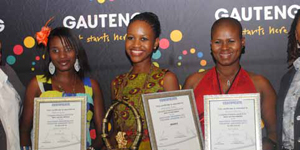 But Tobo, 26, did not let the attitude of others side-track her from her dream, leaving all of it behind to become an award winning actress.
But Tobo, 26, did not let the attitude of others side-track her from her dream, leaving all of it behind to become an award winning actress.
Like many other ambitious young people from across the country, she was consumed by her will to succeed.
That determination saw her packing her bags, leaving the dusty village of Bizana and making the long trip to the City of Gold (Johannesburg) to chase her dream.
Two years down the line, Tobo has made significant progress in chasing that dream and was named Best Female Actress at the annual Ishashalazi Theatre Awards held at the Carletonville Civic Theatre recently.
The Ishashalazi Theatre Awards is an initiative of the Gauteng Department of Sport, Arts, Culture and Recreation, in partnership with the Gauteng Theatre Practitioner’s Committee, and is aimed at rewarding excellence in the performing arts.
At the awards, Tobo walked away with R10 000 and a trophy for her role in the play It’s a Wrap. She outperformed other actresses despite only making an entry in the 2012/13 season of the developing theatre programme.
“This is a great honour to be recognised for my work on Ishashalazi Theatre programme. The platform has given me an opportunity to boost my confidence as a performer in order for me to take my art to greater heights. I hope it will open doors for greater things in the future and help me make my mark in this tough industry,” she said.
As an up-and-coming artist, Tobo wants to see more government help for struggling new artists.
“There are a lot of challenges in the industry and its tough, especially for us new artists. Although government is doing something, I wish they could do a little bit more,” she added.
Eddie Matladi, 31, from Daveyton won the Best Male Actor Award for his performance in the production Silver Coat and Black Stick. Matladi was judged as the best during the Ishashalazi Theatre festivals held in December 2012 and again in February this year at the Soweto Theatre.
Other winners included:
- Best Production: It’s a Wrap directed by Thembeni Joni (R50 000 in prize money).
- Best Supporting Male Actor: Sibusiso Mashwayi for Moral Dilemma (R6 000).
- Best Supporting Female Actor: Mpho Motjopi for Reflections in the Mirror (R6 000).
- Best Script: The System written by Alex Motswiri (R15 000).
- Best Director: Alex Motswiri for The System (R12 000).
- Best Set Design: Silver Coat and The Black Stick (R10 000).
- Most Promising Production: Pitsa Diatsha directed by Lebeko Nteku (R15 000).
- Against All Odds Award: Basetsana Moruakgomo (posthumously) for the script: My Best Friend’s Ghost.
- Lifetime Community Theatre Development Award: Bongani Linda for work done with Victory Sonqoba Theatre Company (R20 000).
- The Basetsana Script Writing Award, with a R10 000 prize, went to Salome Sebola for her script on the play titled Truth. The award culminates from the Ishashalazi All Woman Script Writing Workshop that is aimed at empowering women script writers and directors.
Soccer programme puts youngsters on track
Soccer programme puts youngsters on track sadminSport, arts and culture
Emerging soccer stars in Mogale City, Gauteng are one step closer to making their dreams a reality thanks to a partnership that brings sports academies to life.
 Now in its fourth year, the Suncares Sports Academy is a soccer programme that provides young learners in Mogale City with a full year extra-curricular programme. The programme is joint venture between Tsogo Sun, Mogale City Municipality, the Departments of Education and Sports, South African Football Association (SAFA) and South African Schools Football Association.
Now in its fourth year, the Suncares Sports Academy is a soccer programme that provides young learners in Mogale City with a full year extra-curricular programme. The programme is joint venture between Tsogo Sun, Mogale City Municipality, the Departments of Education and Sports, South African Football Association (SAFA) and South African Schools Football Association.
Working with community business and organisations, the programme provides a comprehensive school sports programme to more than 900 learners and 40 school coaches.
It includes season opening and closing soccer tournaments, inter-school leagues run weekly for six months, coaching the coaches programmes as well as a development academy for talented players.
The most talented players from each age group are also provided with an opportunity to participate in a SAFA affiliated league each year.
In addition, the programme contributes to economic development in the community by making use of local suppliers from the greater Kagiso community.
Speaking at the recent launch of the annual tournament held at the Lusaka Sports Complex, sports coordinator Lucky Moetlhoa said that the programme had benefits to learners both on and off the field.
“The programme helps in guiding and moulding the learners into responsible and disciplined youngsters. Here they are taught about respect, building friendships, team building and the importance of education. I am also happy with the programme as it keeps the kids off the streets even during weekends and school holidays,” Moetlhoa said.
Soccer legend Lucas Radebe echoed Moetlhoa’s sentiments, stressing the importance of keeping a good balance between schoolwork and football.
He described the programme as a great initiative, saying the nurturing of future stars needed to start the grassroots level.
“Soccer is not only about playing, but it adds values such as respect, team work and persistence. These are some of the values that they will be able to use later in their lives,” Radebe said.
Also at the launch was Miss Earth South Africa Tamerin Jardine who urged the learners to always be optimistic and follow their dreams.
“Being dyslexic, I was told I will never succeed in life but through hard work and persistence today I hold two degrees. Kids need to realise that no matter how difficult it is, they need to keep on working hard. We are faced with a lot of challenges but to succeed we need to prioritise education, live healthy lifestyles and take care of our environment not only for us but for future generations too,” Jardine advised.
* Melitah Madiba works in the Gauteng Office of the Premier